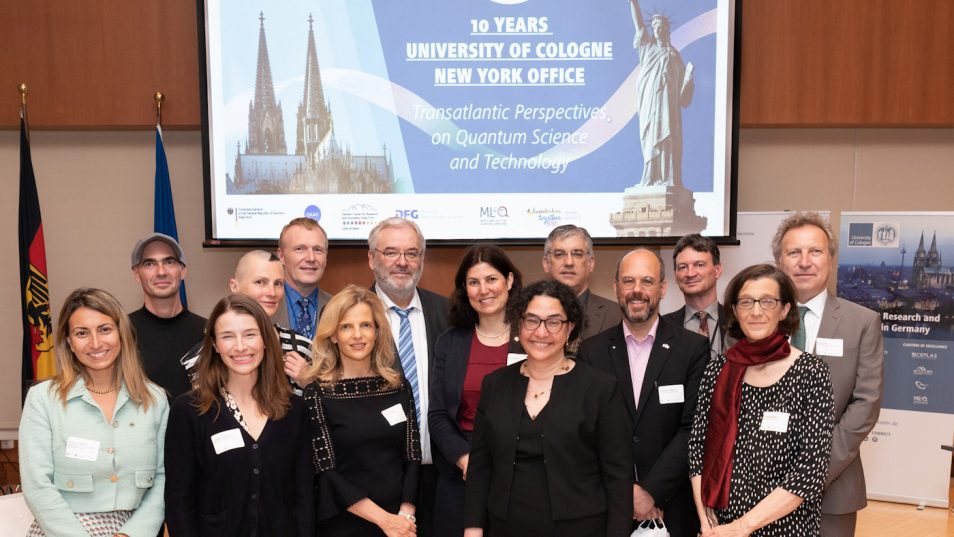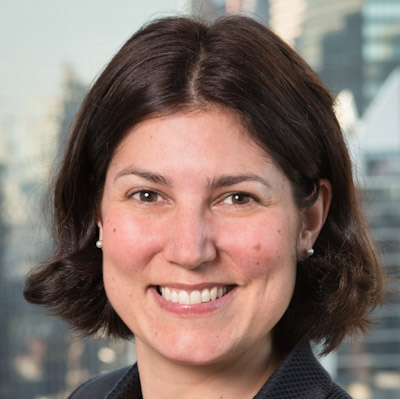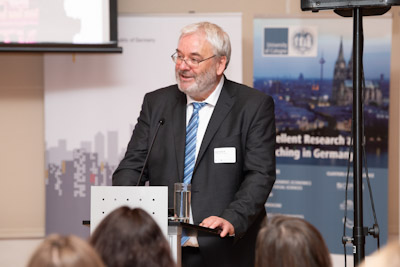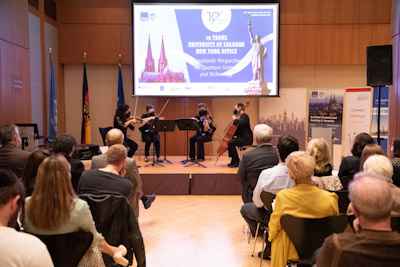10 Years University of Cologne New York Office
 © Nathalie Schueller
© Nathalie Schueller
The University of Cologne’s North America Office celebrated its 10th anniversary at the German House in New York on May 26 with a festive in-person event, featuring art, music, networking, and the panel discussion “Transatlantic Perspectives on Quantum Science and Technologies.” The honorary guest was Rector Prof. Dr. Dr. h.c. Axel Freimuth, heading a delegation from the University of Cologne. The DWIH team took this anniversary as an opportunity to talk with Dr. Eva Bosbach, Executive Director of the University of Cologne North America Office.

Hello Eva, tell us a bit about yourself. Where are you from and what brought you to New York?
Thanks! I am originally from Prague, the Czech Republic, and received both my Masters and Ph.D. degrees from the German University of Cologne, which I am excited to represent in North America for five years now. Prior to coming to New York, I worked as Program Manager at the German Rectors’ Conference (HRK) in Bonn, Germany. At the time I wrote several comparative studies about doctoral education and the humanities in Germany and the U.S. One of these, Von Bologna nach Boston, did in fact bring me to the U.S., and another one, Promotion in den Geisteswissenschaften, became my dissertation. It was funny meta-level work – a PhD about getting a PhD! After that, I became a mother of two and volunteered in a few positions for our community, which earned me honorary NYC Council and NY State Assembly Citations in 2017. As part of my current work as Executive Director of the University of Cologne New York Office, it is my pleasure to also serve on the Boards of the German Centers for Research and Innovation (DWIH) in New York and San Francisco. So, I have worked in this role for 5 years now; however, the New York Office is active for over 10 years already.
Ten years of University of Cologne New York Office – we really enjoyed the big celebration at the German House. What were your personal impressions?
The 10th anniversary celebration truly was a personal highlight for me. The university president and vice-president came to the U.S. for this occasion, along with representatives from our International Office and Matter and Light for Quantum Computing (ML4Q), one of our four research clusters of excellence. The delegation also visited Washington D.C., where it initiated talks between the scientific community and the funding agencies of both countries, the German Research Foundation (DFG) and the National Science Foundation (NSF), about potential new funding programs for the strategically important research in quantum science. At a high-level meeting with the German Ambassador to the U.S. (and University of Cologne alumna) Dr. Emily Haber, the delegation discussed future technologies with several parties, including representatives from the Department of State and the White House Office of Science and Technology Policy.
The main event at the German House in New York featured lovely art, music, and networking opportunities (including Kölsch 🙂 ). But what struck me as really positive is that we could present to the North American audience not only the work of our ML4Q cluster, but also the University of Cologne’s excellent research across a wide range of topics relevant for our society. The best part for me was that we were able to celebrate together in person with our fantastic partners here. Speaking of whom: Many thanks to DWIH New York Director Benedikt Brisch for his inspiring Partner Spotlight at the event!
Now that you have celebrated the last ten years, let’s look into the future: What event formats or what activities do you have planned in the coming months?
To mark the 10th anniversary of the University of Cologne New York Office, we developed a new virtual event format to showcase outstanding transatlantic research collaborations of the University of Cologne faculties and clusters of excellence with its U.S. partners. In these now well-established Transatlantic Tandem Talks (TTT) which are co-hosted with (fittingly) ten different partners including the DWIH New York, we already presented transatlantic discussions on Black Lives Matter, Plant Sciences, Political Psychology, Climate and Africa, and Healthy Aging, as well as AI, Law and Ethics. The TTTs proved very popular, with an average of 200 active participants at each virtual event, joining us from many different countries. Therefore, we will definitely continue this successful series with our partner organizations. Currently we are planning a TTT in the field of economics with our cluster of excellence ECONtribute: Markets & Public Policy. Beyond further TTTs, in the coming months I am looking forward to the annual German Academic International Network (GAIN) conference in September. And, of course, to the DWIH New York Future Forum in October!
Thank you, Eva, for the interview and all the fruitful collaborations with the DWIH New York. We look forward to many more years of great teamwork!
A look back at the event on May 26 at the German House

The evening commenced with welcoming remarks by Yasemin Pamuk, Consul for Culture and Science, and Prof. Axel Freimuth, as well as partner spotlights by Benedikt Brisch, Director DWIH and DAAD New York, and Dr. Georg Bechtold, Director DFG North America, moderated by Dr. Eva Bosbach, Executive Director, University of Cologne New York Office. The string quartet Maren Rothfritz & Friends presented classic and modern music pieces and Dmitry Gelfand and Evelina Domnitch exhibited live their art installation “Force Field.”
The welcomes and artistic interludes were followed by an expert panel discussion highlighting the University of Cologne’s Research Cluster of Excellence “Matter and Light for Quantum Computing” (ML4Q) and its partner institutions in Germany and the U.S. The cluster develops state-of-the-art computing and networking architectures using the most recent findings from fundamental research in solid-state physics, quantum optics, and quantum information science. Scientists have theorized about the potential of quantum computing for decades, but only in recent years have private and public sector investments in the development of quantum technologies grown significantly. Rapid advances in quantum technologies could revolutionize the world as we know it – from genomic sequencing to transport route optimization, from code-breaking to artificial intelligence.

The discussion, moderated by Dr. Christina Horsten, New York Correspondent of the German Press Agency (DPA), provided fascinating insights into quantum physics with input from the panelists Prof. Anna Grassellino, Director, National Quantum Information Science SQMS Center, Prof. Tommaso Calarco, ML4Q, University of Cologne and Christopher Monroe, Duke University and IonQ Inc, presenting perspectives from both sides of the Atlantic on quantum research, competition, and collaboration in the international quantum arena. In her closing remarks, Prof. Johanna Hey, Vice-Rector for International Affairs, University of Cologne, thanked the panelists, moderators and organizers for the transformative event, and the many partners of the UoC New York Office for their continuous support throughout the past 10 years.
The event concluded with a festive dinner and music reception at the German House Restaurant on the 23rd floor, where participants networked, refreshed their German-American connections, and explored new collaborations. The event proved to be a great opportunity for old and new friends of the University of Cologne, alumni, partners, and scientists to come together and celebrate the University of Cologne New York Office’s 10th anniversary.
Co-hosts of the evening were the University of Cologne New York Office, the German Consulate General New York, the German Research Foundation (DFG) North America, the German Academic Exchange Service (DAAD) New York, the Cluster of Excellence Matter and Light Quantum Computing (ML4Q), Wunderbar Together, and the German Center for Research and Innovation (DWIH) New York.
You can watch the recording of the event and scroll through the picture gallery.

